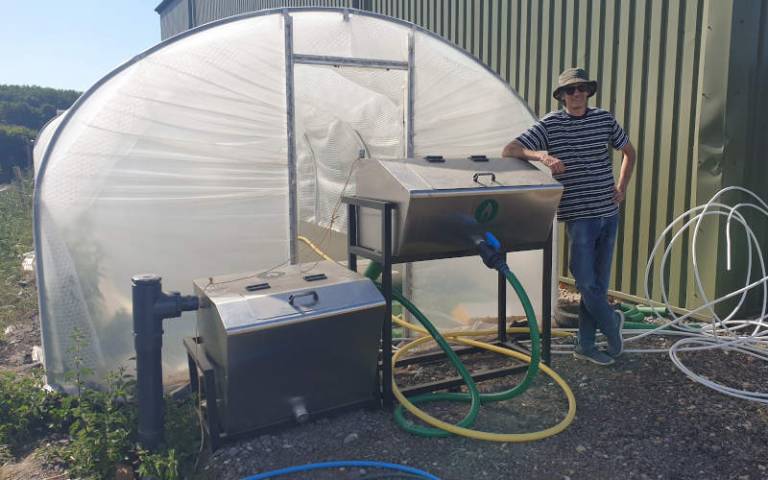UCL agri-tech startup receives £140K from climate investment fund
8 July 2020
EcoNomad Solutions receives £140,000 from the SHAKE Climate Change Programme to commercialise its innovative biodigester and improve sustainability and waste management on small farms.

Dr Ilan Adler (UCL Civil, Environmental and Geomatic Engineering) is the Founder and CEO of EcoNomad.
EcoNomad’s biodigester takes manure and farm waste and produces biogas for heating or energy generation as well as liquid fertiliser for crop soil.
The technology is based on anaerobic digestion, which is normally only possible at large scale and considerable cost. But EcoNomad is aiming to bring these benefits to small farms and communities with a solution which is affordable and easy to install and operate, as Ilan explains:
“It’s basically a small-scale biodigester that utilises nature as much as possible, using natural bacterial cultures and passive energy and sunlight (when available) to heat-up. That in itself is not that original, but what we’ve done is bring it down to a very manageable and affordable scale.”
The value of waste
For the past year, EcoNomad has been working on testing a prototype of their biodigester, as part of a project called AgRIA. This project is funded by the European Regional Development Fund (ERDF) and supported by Rothamsted Research and UCL.
They achieved this important milestone in June on a working a farm near St Albans in Hertfordshire.
“The farm has stables with around 50 horses, and the manure tends to just sit there in a big muck heap. We feed it into the the biodigester to produce heat and biogas and liquid nutrients to use on the fields,” Ilan says.
As part of AgRIA, EcoNomad is working with leading chemists and agricultural scientists to characterise the precise composition of this liquid fertiliser.
Ilan explains: “In a big pile of manure there is fertilising nitrogen present, but it’s a very raw form of nitrogen and a lot of it gets lost into the atmosphere or remains at the soil surface rather going down into the roots. Our biodigester converts this into a liquid form and the bacteria break it down into smaller molecules, into something we call readily available nitrogen, which the plants can absorb a lot quicker.”
The path to commercialisation
The £3.5 million SHAKE Climate Change Programme was set up in 2019 by a consortium of leading scientific research and academic institutions in the wake of the climate emergency. It has financial backing from the UK-based charitable arm of a major European bank.
EcoNomad is among the first three companies SHAKE has invested in, with each receiving £140,000.
The company will use this capital to drive their now-trademarked BionomadTM product to market. The company has recently taken on its first full-time staff member (a UCL engineering graduate), while Ilan will go part-time in his role as Principal Teaching Fellow to focus more on the company.
Supporting entrepreneurial journeys
Over a number of years, Ilan has received advice, support and grants from UCL Innovation & Enterprise. For example, in 2018, Ilan was supported in a successful application for a prestigious Royal Academy of Engineering Enterprise Fellowship.
More recently, the company undertook a knowledge exchange project, supported by UCL’s Higher Education Innovation Fund (HEIF) allocation from Research England. This involved working with an industrial partner on an online product design process.
EcoNomad has also worked with the Global Innovation team, through their Enterprise Europe Network (EEN) activities, on a project aimed at improving off-grid energy and water access through innovative passive thermal technologies. The technology will first be experimented in Ethiopia in collaboration with Bahir Dar University.
Kathryn Walsh, Director of Knowledge Exchange Policy & Practice at UCL Innovation & Enterprise, said: “Ilan and the team at EcoNomad have worked tirelessly in their mission to improve sustainability and waste management on small farms and it’s heartening to see their solution gain real traction. They’ve shown the great potential of community-scale clean-tech solutions and we will be working with EcoNomad in the future on exciting new projects in this field.
Links
Find out more about:
- innovation and enterprise support for UCL staff
- knowledge exchange funding for UCL staff
- support available to SMEs from the Global Innovation team
- SHAKE Climate Change Fund
- EcoNomad Solutions
Photo © Dr Ilan Adler
 Close
Close

